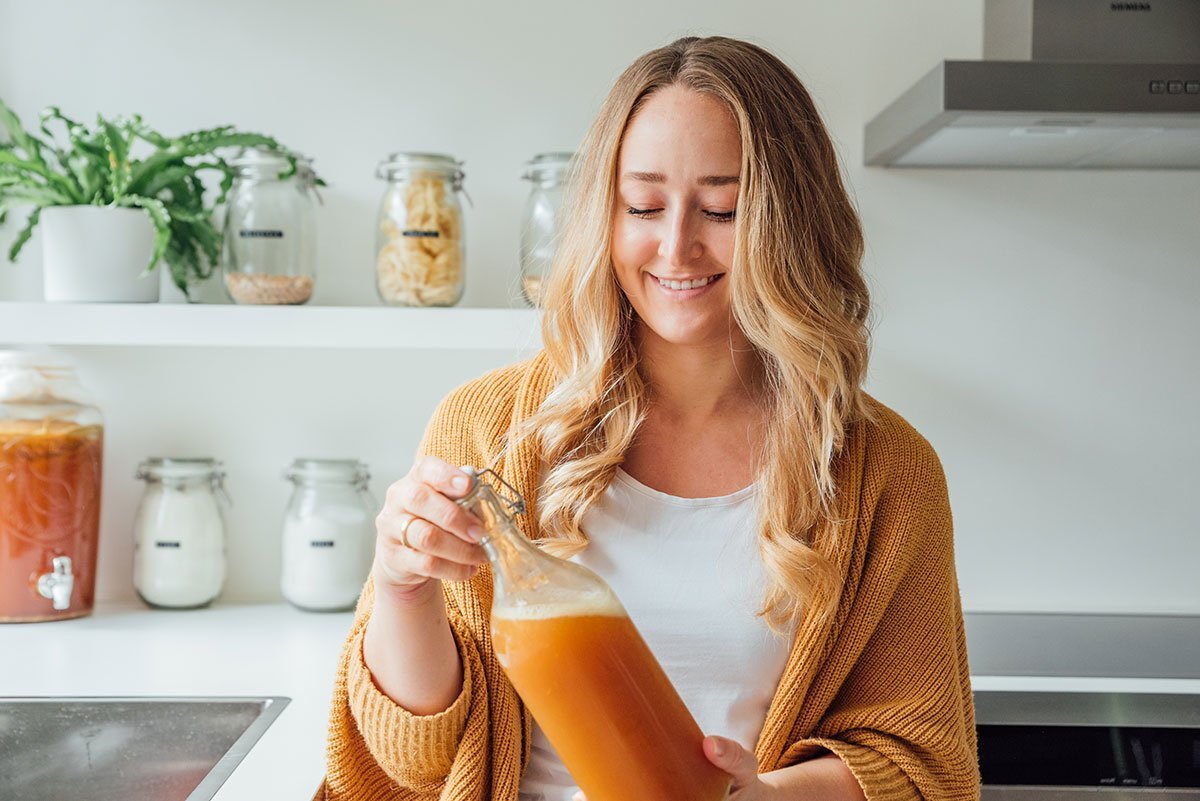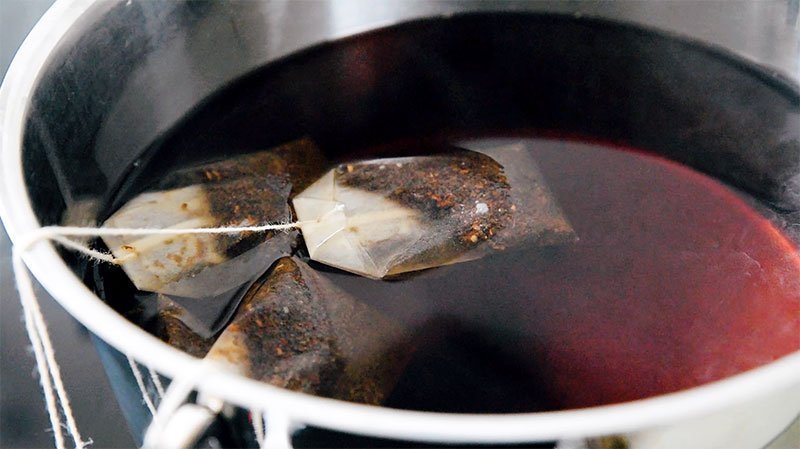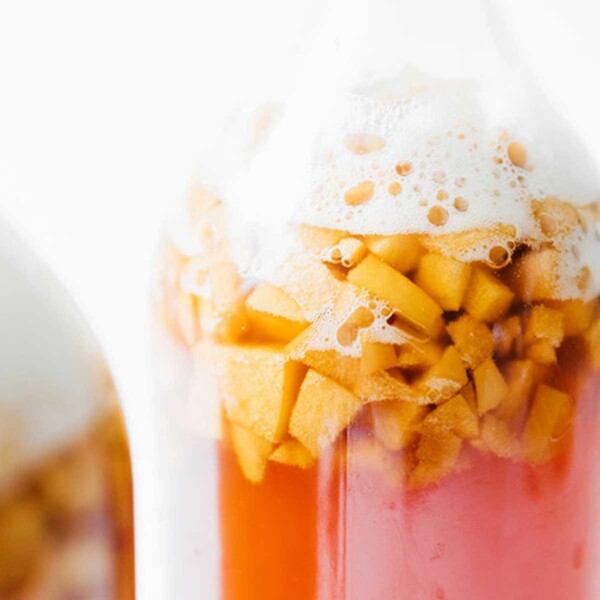Have you wondered what is the best time to drink kombucha in your day? It all comes down to your goals and sensitivities. Breaking down all the details on when to drink kombucha here!

Drinks have a way of defining our day. There’s the coffee or tea in the morning. The smoothie or protein shake in the afternoon. The occasional glass of wine (or two or three) in the evening. But where does kombucha fit into the mix? And is there a best time of day to drink kombucha?
For the uninitiated, kombucha is a fizzy fermented tea with many health benefits, to include being:
- full of gut-loving probiotics
- a lower sugar alternative to soda
- a good source of antioxidants
- hydrating
So when should you be drinking this healthy elixir? It all comes down to your sensitivities. Specifically, if you are sensitive to caffeine, alcohol, or probiotics.

Kombucha in the morning
The probiotics in kombucha are one of the reasons people love it! But if you drink kombucha on an empty stomach in the morning and aren’t yet accustomed to these probiotics, you may experience an upset stomach.
But if you are used to drinking kombucha, drinking it on an empty stomach is the best way to maximize the potency of the probiotics. Without food getting in the way, they’ll pass through your stomach more quickly, meaning more probiotics will make it to your large intestines (i.e. where they work their magic).
You should also be aware that kombucha can contain alcohol. Though store bought kombucha usually contain less than 0.5% ABV, homemade kombucha can contain more. If you are sensitive to alcohol, avoid drinking kombucha in the morning (although, I mean, it’s 5 o’clock somewhere, right?) (learn to make hard kombucha here!).
Kombucha at meal time
Drinking kombucha with or after a meal is thought to aid digestion. The carbonation of kombucha may also make you feel more full, which can be useful if your goal is weight loss.
Traditional ayurvedic medicine says that consuming sour/acidic foods and drinks before a meal can also aid in weight loss, though we couldn’t find scientifically supported research to substantiate this.
Kombucha at night
Kombucha is typically made from black or green tea, which can contain caffeine. Though the caffeine content is less after fermentation, there is still caffeine present in the finished brew – about 10 to 25 mg of caffeine per cup (for reference, a cup of coffee contains about 40 mg). If you are sensitive to caffeine, it’s best not to consume kombucha in the hours before bed.





I just discovered something wonderful! I was juicing some oranges and wondered how it would taste in my kombucha so added a little – result was fantastic! Light , zesty, zingy taste!!! But is it OK to do this?? Please say yes, I loved it!!
Yes of course! Orange kombucha (with a little vanilla or cinnamon) is delish! 😀
I have been drinking Kombucha and was just drinking it in the am my sleep was good but I added some in the late afternoon and am having sleeping problems I am also stressed out so is thete alot of caffeine in it?
Check out this article about caffeine in kombucha! 😀
Can drinking Kombucha in the evening/at night lead to SIBO?
I haven’t heard of this, but best to consult with your doctor for health-related questions!
Can I use Organic Honey, Monk Fruit sugar, Coconut sugar or Date sugar instead of regular white cane sugar if I make my own Kombucha at home?
Here’s our guide to the sugars you can use in making kombucha!
In South Africa we have two teas called Roibos (Redbush) and Honeybush which can grow wild and both are farmed commercially. These belong to the Fynbos (floral kingdom)family and do not contain any Caffeine.
When drinking these teas without milk they become great re-hydrators and are very very healthy.
Thanks for the information. So silly question: is it ok to drink kombucha with ice, or does that harm the microbes? Thanks
Ice is totally fine! 😀
Is it common for your stomach to hurt after drinking it and why ? Because I told online to drink it on an empty stomach in the morning, as soon as I had 2 to 3 sip , my stomach starting hurting really badly
Everyone is a little different, but drinking it on an empty stomach would probably hurt most people’s stomachs! I would wait until you eat something 😀
I am caffein sensitive but surprising i slept well after drink kombucha and it can goes into calm deep sleep
I am also pretty sensitive to caffeine but also found this be true. I’ve been drinking a little before bed and it puts me into a very deep sleep. Very surprising…wonder why?
It’s the alcohol content in the brew that makes you drowsy
Hi Sarah
I worry that my Kombucha is too sweet? I am very wary of having sugar because of my gut so I am concerned about the sweetness although it is delicious. I use 1 cup sugar to 3.3Lt of tea.I leave it to ferment for 10 days.
I would love to hear your thoughts.
Hi Charlotte! I would just let it ferment for longer then. In the winter it can take much longer, sometimes up to a month!
Can you make Kombucha without the caffeine? I have found that caffeine is not my friend. ????
Good question! After fermentation, however, the caffeine content is lessened because the bacteria and yeast feed on it. With that said, there are a few ways you can further reduce the caffeine content of your kombucha.
• Let the fermentation run longer, allowing more time for the caffeine to be consumed by the SCOBY.
• Use lower caffeinated teas, like rooibos, hibiscus, white, or green. For SCOBY health, we still recommend throwing a bag or two of black tea in.
• Let caffeinated tea bags steep in boiling water for 30 seconds. This will pull out most of the caffeine, and you can then use the tea bags to make your kombucha.
Yes use decafe green tea bags